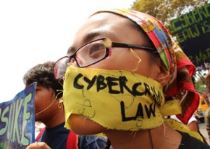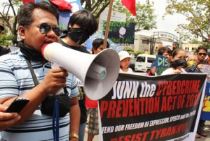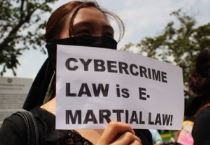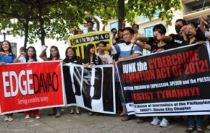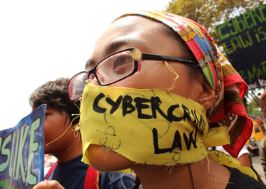
DAVAO CITY (Mindanao Examiner / Oct. 9, 2012) – The Philippines Supreme Court has stopped the implementation of the controversial “Cybercrime Law” following several petitions by media groups and human rights organizations for a temporary restraining order.
Yap expressed relief for the reprieve, saying that this could pave the way for much needed amendments in the law. He said the inclusion of libel in the Cybercrime Law should be declared null and void because based on the list of crimes punishable under Republic Act 101075; the nature of libel is outside the nature of the enumerated subject crimes under the law.
“One big disparity between libel and cybercrimes is that the former is committed by means of publication or making it known to the public while the latter is perpetrated by acts that are in nature hidden. Acts constituting any of the cybercrimes are done secretly as in stealing password, computer hacking or gaining access into computer systems or data, stealing PIN codes of computer data, banks accounts and other records for profit. ”
It said the law essentially would tend to give liberty for the powerful to tag the freedom of citizens speaking out their opinions and views online as a criminal act. “It basically says that people who post online criticisms on public officials or on institutions and anyone who agree on such comments will face the consequences. The consequences in this case are a libel suit, a jail term, and having one’s website or online accounts pulled down by authorities,” it said.
NUJP said with the Cybercrime Act, those in power can silence their critics by slapping them with online libel. Just like politicians using libel against journalists, they can and will use this Act to attack citizens.
“This only reflects an administration that does not tolerate dissent. It also enforces the reality that repression, which is happening with the deprivation of our right to social services, housing and education, is happening to us online. It shows that Aquino is now the bully as he defies his boss, the people.”
“Thus, the right to express our criticisms becomes vital more than ever. Media, traditional and new ones, serve as the outline of the peoples’ assertion of their rights. As the Supreme Court sits en banc today, we demand that our petitions are heard; we assert that no law should be made to stifle such freedom. As we see an iron-fist rule coming, we face this by coming out on the streets, on media and online with the urgent call to defy it,” it said.
The Filipino migrants’ rights group, Migrante-Middle East, which is actively involved in protesting the implementation of the controversial law to protect overseas Filipino workers from the harsh provision of the Cybercrime Prevention Act, also lauded the High Court’s decision, but vowed to continue for the repeal of the Republic Act 101075.
“We congratulate all overseas Filipino workers online and onsite, who have joined our fight versus the Cybercrime Law, as the Supreme Court today issued a Temporary Restraining Order halting the implementation of the law for the time being. But we vow to continue our fight until the Cybercrime Law is declared unconstitutional,” said John Leonard Monterona, Migrante’s regional coordinator. (Mindanao Examiner)

